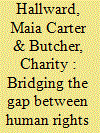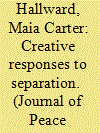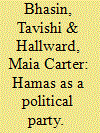|
|
|
Sort Order |
|
|
|
Items / Page
|
|
|
|
|
|
|
| Srl | Item |
| 1 |
ID:
152738


|
|
|
|
|
| Summary/Abstract |
While the concepts of human rights and peace are increasingly linked in the study and practice of International Relations, there is great variance and inconsistency in how the concept of peace is discussed in the study and practice of human rights. We conduct an examination of the websites of human rights nongovernmental organizations (NGOs) affiliated with the United Nations Human Rights Council in Geneva, Switzerland, to explore whether and how human rights and peace are linked. Religiously-affiliated and women’s NGOs typically link these concepts, while non-Western NGOs stress peace over human rights.
|
|
|
|
|
|
|
|
|
|
|
|
|
|
|
|
| 2 |
ID:
090139


|
|
|
|
|
| Publication |
2009.
|
| Summary/Abstract |
This article examines creative ways in which Israeli and Palestinian activists engage with each other and the powers seeking to separate them in their nonviolent struggles for a just and lasting peace. Using the geopolitical theory of territoriality, the article briefly examines a number of administrative, physical, and psychological barriers facing joint activism and the strategies activists use to counteract them. Drawing on nonviolent theory and practice, the article analyzes how activists exert power through the creative use of symbols and practices that undermine the legitimacy of occupation policies. Based on fieldwork conducted in 2004-05 and July 2006, the article explores the implications of this activism on conceptions of identity, and strategies for restarting a moribund peace process. The relative `success' of sustained joint action in Bil'in can provide scholars and policymakers with innovative approaches for addressing some of the outstanding issues needing to be addressed by official negotiators. Although government bodies are more constrained than activists, the imaginative means of engaging with the system - and the reframing of issues through the redeployment of `commonplaces' - can perhaps provide inspiration, if not leverage, for thinking outside of the box.
|
|
|
|
|
|
|
|
|
|
|
|
|
|
|
|
| 3 |
ID:
120320


|
|
|
|
|
| Publication |
2013.
|
| Summary/Abstract |
Why do violent movements participate in elections? To answer this question, we examine Hamas's formation of the Reform and Change Party and its iconic victory in the 2006 elections to the Palestinian Legislative Council. We argue that Hamas's formation of this party was a logical step, following nearly two decades of participation in local and municipal elections. Hamas's need to attract resources from external donors, who make funding decisions based on civilian support for the movement, best explains why Hamas decided to participate in local elections in the early 1990s, taking Hamas on a path that eventually led to its 2006 legislative victory. Hamas's foray into elections was consistent with its dual strategy of directing violence against Israel and building Palestinian support through welfare services. We demonstrate that changes in political opportunities (Fatah's decline and the increase in Hamas's popularity), institutional incentives (lax electoral laws and the holding of municipal elections), and the rise of moderate voices within Hamas explain the timing of its entry into legislative elections. Finally, we discuss Hamas's electoral victory, the need for cooperation between Fatah and Hamas, and the role played by international actors as significant factors influencing prospects for peace and democratization in the region.
|
|
|
|
|
|
|
|
|
|
|
|
|
|
|
|
| 4 |
ID:
081358


|
|
|
|
|
| Publication |
2008.
|
| Summary/Abstract |
In recent decades, scholars in the field of international relations (IR) have increasingly paid attention to issues of religion-often linked to "civilizational" and "cultural" identities. The IR field at large unconsciously assumes, however, that there is a "secular" "norm" against which the "religious" dimensions of IR can be analyzed or compared. Western IR scholars often take the "secular" for granted, rarely considering how the boundaries of the "secular" are defined and deployed in scholarship and policy. Building on decades of debate over "secularization theory" by sociologists of religion examination of secularist assumptions in IR theory, this article suggests that defining secularism as a political negotiation over the accepted role of religion in public life rather than as an a priori category has methodological and theoretical consequences to which IR scholars and policy makers, particularly those interested in issues of democratization and religious fundamentalism should pay attention. Using illustrations from the Middle East-a current focal point for debate on both democratization and religious fundamentalism-this article builds on the secularization debate to suggest that IR scholarship treating the "secular" and "religious" as opposing categories obscures more than it explains in terms of analyzing the role of religion in contemporary Middle Eastern politics
|
|
|
|
|
|
|
|
|
|
|
|
|
|
|
|
|
|
|
|
|